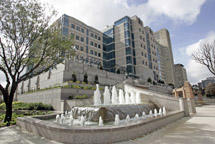
The University of Texas MD Anderson Cancer Center
Giulio Draetta, M.D., Ph.D. , Senior Vice President & Chief Scientific Officer
Houston, Texas
Main:
(713) 792-6161
Created by the Texas Legislature in 1941 as part of The University of Texas System, MD Anderson is one of the nation’s original three comprehensive cancer centers designated by the National Cancer Act of 1971. It exclusively focuses on cancer, with the mission to end cancer for patients and their families in Texas, the nation, and the world.
MD Anderson continues to innovate cancer care through programs that integrate patient care, research, prevention, and through education for undergraduate and graduate students, trainees, professionals, employees, and the public. MD Anderson has been consistently ranked one of the nation's top two hospitals for cancer care by U.S. News and World Report’s “Best Hospitals” survey since the survey’s inception in 1990.
Research at MD Anderson Cancer Center
Cancer is the singular focus for MD Anderson’s 22,000 employees, including nearly 1,800 faculty scholars who lead the most NCI-funded grants and clinical trials in the nation. In fiscal year 2020, for example, MD Anderson invested $973 million in four key areas of research: basic science, translational research, clinical research, and prevention and personalized risk assessment. Wide-ranging clinical trials have paved the way for many lifesaving drugs and therapies. In 2018, MD Anderson immunologist James Allison, Ph.D., was awarded the Nobel Prize for his pioneering work in immunotherapy, a way of attacking cancer by treating the immune system rather than the tumor.
Select Scientific Initiatives at MD Anderson Cancer Center
Multidisciplinary care is a hallmark of MD Anderson, with experts collaborating on care plans for patients from diagnosis to treatment and beyond. MD Anderson also fosters a spirit of ingenuity among faculty and trainees through initiatives dedicated to exploration, research, and cancer prevention.
In particular, MD Anderson’s Therapeutics Discovery division is a team of over 100 clinicians, researchers, and drug development experts collaborating on small molecule, biologic, and cell-based therapies with goals to eliminate bottlenecks in traditional drug development and create lifesaving medicines quickly, safely, and effectively.
MD Anderson founded the TMC3 project, a 37-acre research campus that brings together scientists, industry partners, and venture capital firms in a multi-institutional life sciences ecosystem. The ambitious project assembles world-renowned institutions and some of the brightest minds in clinical care, research, and industry.
MD Anderson’s focus on team science is also seen in its Moon Shots Program®, which launched in 2012 to accelerate the pace of scientific discoveries into clinical advances that reduce cancer deaths. In its first decade, it advanced treatments in lung cancer, melanoma, leukemia, and other cancers.
MD Anderson also houses one of the largest cancer prevention programs in the nation, the Cancer Prevention and Population Sciences division. Its research assesses and manages cancer risk through early detection, genetic counseling, and clinical interventions, as well as implementing prevention programs that include genetic testing, chemoprevention, and behavioral and nutritional counseling. The institution's ultimate goal is to keep people in a state of health and wellness, preventing them from crossing the threshold to disease and requiring treatment.
* Information on this cancer center profile was provided by MD Anderson Cancer Center.